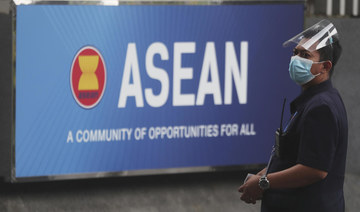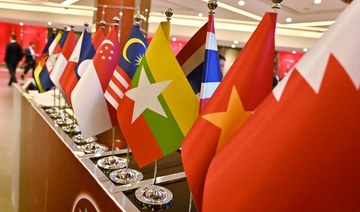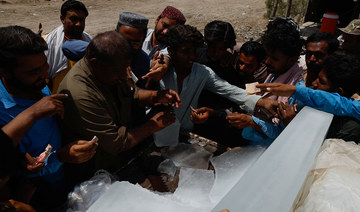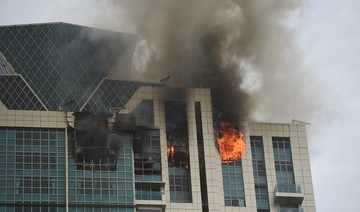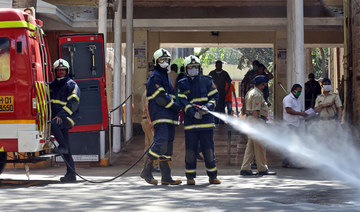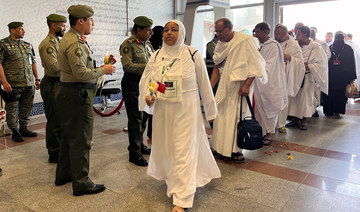BANDAR SERI BEGAWAN: Australia and the Association of Southeast Asian Nations (ASEAN) agreed at a summit on Wednesday to establish a “comprehensive strategic partnership,” a sign of Canberra’s ambition to play a bigger role in the region.
The pact would further strengthen Australia’s diplomatic and security ties in a fast-growing region that has become a strategic battleground between the United States and China.
While concrete strategic objectives of the partnership were not immediately announced, Prime Minister Scott Morrison promised Australia would “back it with substance.”
“This milestone underscores Australia’s commitment to ASEAN’s central role in the Indo-Pacific and positions our partnership for the future,” he said in a joint statement with Foreign Minister Marise Payne. “Australia supports a peaceful, stable, resilient, and prosperous region, with ASEAN at its heart.”
Brunei, serving as chair of ASEAN, said the agreement “marked a new chapter in relations” and would be “meaningful, substantive and mutually beneficial.”
After the announcement, Australia said it would invest $154 million in projects in Southeast Asia on health and energy security, counter-terrorism, fighting and transnational crime, plus hundreds of scholarships.
China has also sought an agreement on the same strategic level with ASEAN. Premier Li Keqiang met ASEAN leaders on Tuesday, and the bloc’s leaders will meet China’s President Xi Jinping in November at a special summit, to be held virtually, two diplomatic sources told Reuters.
Australia already has bilateral strategic partnerships of various levels with Indonesia, Malaysia, Thailand, Singapore, the Philippines and Vietnam.
STABILITY AND SECURITY
Morrison also sought to reassure ASEAN that a trilateral security pact agreed last month between the United States, Britain and Australia, under which Australia will get access to nuclear-powered submarines, would be no threat to the region.
One ambassador to ASEAN, who asked not to be identified, said Australia clinching the comprehensive strategic partnership with ASEAN was “quite something” in the wake of regional reservations over its new AUKUS pact with Washington and London.
“Kudos to Australia,” the ambassador said.
AUKUS has raised some concerns in Southeast Asia that China could see it as a move by the West to challenge its growing influence in the region, particularly in the South China Sea.
The United States and allies have increased patrols to challenge Beijing’s vast maritime fleet which it deploys to buttress its claims to sovereignty over most of the South China Sea.
“AUKUS adds to our network of partnerships that support regional stability and security,” Morrison said.
Indonesian President Joko Widodo on Wednesday said he was concerned AUKUS “could spark rivalry in the region,” according to his foreign minister, Retno Marsudi.
US ally the Philippines has backed AUKUS but its president, Rodrigo Duterte, on Wednesday said it “must complement and not complicate our working methods for cooperation.”
Military analysts have said the nuclear submarines Australia will purchase from the United States have unmatched stealth and underwater longevity. China has opposed the pact and said it could be damaging and intensify an arms race.
US President Joe Biden was due to join the virtual East Asia Summit later on Wednesday, with leaders of China, India, Australia, New Zealand, Russia and South Korea, Japan and ASEAN members.
In an earlier meeting, Japanese Prime Minister Fumio Kishida stressed to Southeast Asian leaders his country’s strong opposition to challenges to a free and open maritime order, underscoring regional concerns about China’s growing military clout.
Southeast Asian states announces new strategic pact with Australia
https://arab.news/4pge9
Southeast Asian states announces new strategic pact with Australia

- Pact would further strengthen Australia’s diplomatic and security ties in the fast-growing region
- China has also sought an agreement on the same strategic level with ASEAN
Myanmar’s Rohingya in the crosshairs as fighting escalates in Rakhine
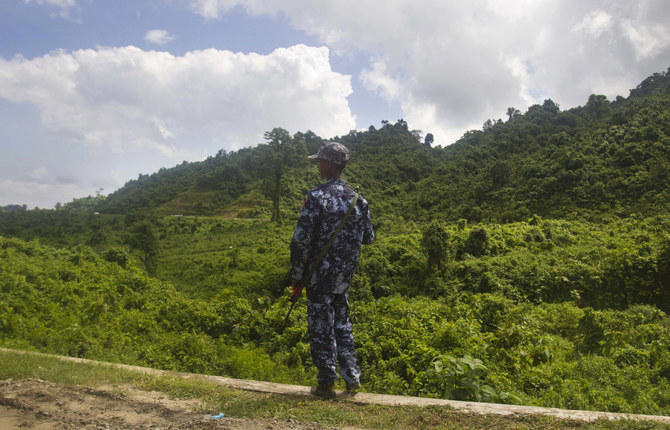
- Tens of thousands of Rohingya are estimated to have fled for safety toward neighboring Bangladesh since mid-May
Tens of thousands of Rohingya are estimated to have fled for safety toward neighboring Bangladesh since mid-May, which is reluctant to accept more refugees, and many of those remaining in Rakhine are in dire need of humanitarian aid.
The Arakan Army (AA) claimed control of Buthidaung town earlier in May following fighting during which the ethnic army was accused of singling out Rohingya community members. The AA denies the charges.
Reuters could not independently verify the claims, and a junta spokesperson did not respond to requests for comment.
The AA is now bearing down on the border town of Maungdaw, also home to a large Rohingya population, that the Myanmar junta will likely attempt to hold, raising the spectre of more serious violence.
“We see clear and present risks of a serious expansion of violence as the battle for neighboring Maungdaw town has begun — where the military maintains outposts and where a large Rohingya community lives,” a spokesperson for the UN High Commissioner for Human Rights said.
The Rohingya have faced decades of persecution and, after a 2017 crackdown by the military, nearly one million fled to Bangladesh, where many now live in crowded refugee camps.
Mohammed Taher, a Rohingya refugee in Bangladesh, said he had recently spoken to a friend in Maungdaw, who described the community living in fear.
“Many want to flee from Rakhine but Bangladesh is not opening its door for Rohingya,” Taher said.
Recent fighting has forced some 45,000 Rohingya to flee to an area along the Naf river on the border, according to a UN estimate.
“No Rohingya will be allowed to enter Bangladesh,” a senior Bangladesh border guard official told Reuters last week.
Myanmar has been in turmoil since a 2021 military coup, which spurred a grassroots armed resistance that is fighting the junta alongside long-established ethnic minority rebel groups.
’CAUGHT IN THE MIDDLE’
The fighting in Rakhine broke out last November when a ceasefire between the AA and the junta collapsed, leading to a string of battlefield successes for the rebels.
“Faced with mounting losses in Rakhine, the regime has resorted to arming members of the Rohingya ethnic minority to counter the Arakan Army’s advance,” Morgan Michaels of the International Institute for Strategic Studies said in a May report.
“The AA has reacted with inflammatory rhetoric and violence directed at the Rohingya.”
Amid the renewed conflict, Rohingya civilians are “increasingly being caught in the middle,” the United Nations Office for the Coordination of Humanitarian Affairs (OCHA) said in its latest report last week.
The agency estimates that over 350,000 people are displaced across Rakhine after years of conflict, many of whom do not have access to basic services.
“We are witnessing a near total absence of humanitarian assistance for communities who rely on it,” medical charity Medecins Sans Frontieres said, adding that hospitals in Buthidaung and Maungdaw were closed.
The AA, which has a goal to form an autonomous state, has warned that more battles are coming, asking civilians in Buthidaung, Maungdaw, and Thandwe to dig bomb shelters or evacuate to safer areas.
The group, which has denied it has targeted the Rohingya, has also asked for international aid for some 200,000 internally displaced people that it says are sheltering in areas under its control in Buthidaung and Maungdaw.
“The situation is incredibly fraught and dangerous,” said Scot Marciel, a former USambassador to Myanmar.
“In some ways, this is an early test of whether a post-military-rule Rakhine State with significant autonomy can work.”
33 Muslims arrested for attacking 2 Christian men on allegations of desecrating Qur’an in Pakistan
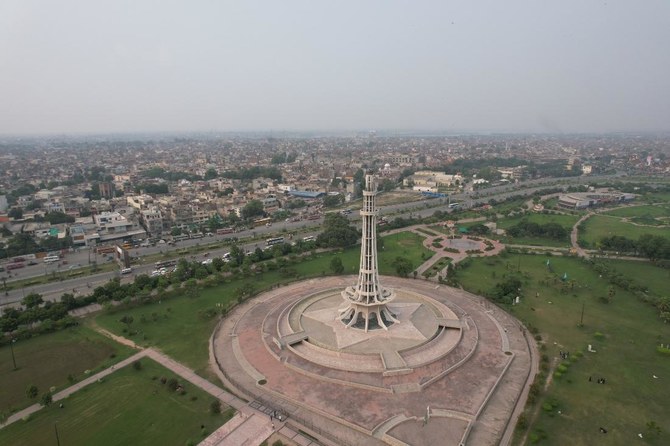
- The blaze fully incinerated the factory and parts of the house
- Blasphemy accusations are common in Pakistan and under the country’s blasphemy laws, anyone found guilty of insulting Islam or Islamic religious figures can be sentenced to death
LAHORE, Pakistan: Police in eastern Pakistan arrested dozens of Muslim men and charged them with attacking a Christian father and son on allegations of desecrating pages of Islam’s holy book, officials said Monday.
The mob went on a rampage Saturday after locals saw burnt pages of the Qur’an outside the two Christian men’s house and accused the son of being behind it, setting their house and shoemaking factory on fire in the city of Sargodha in Punjab province, said senior police officer Asad Ijaz Malhi. They also beat up the son.
Malhi said police forces rescued the two wounded men and transported them to a hospital where they were in stable condition, and that at least 33 men were arrested following multiple police raids. Authorities were chasing others who may be involved in the attack, he said.
The blaze fully incinerated the factory and parts of the house, residents and the police said.
Punjab police said in a statement it beefed up security at churches.
Blasphemy accusations are common in Pakistan and under the country’s blasphemy laws, anyone found guilty of insulting Islam or Islamic religious figures can be sentenced to death. While no one has been executed on such charges, often just an accusation can cause riots and incite mobs to violence, lynching and killings.
The latest violence, however, brought back memories of one of the worst attacks on Christians in Pakistan in August 2023, when thousands of people set churches and homes of Christians on fire in Jaranwala, a district in Punjab province.
Muslim residents at the time also claimed they saw two men desecrating the Qur’an.
Indian police arrest hospital boss after six babies die in fire
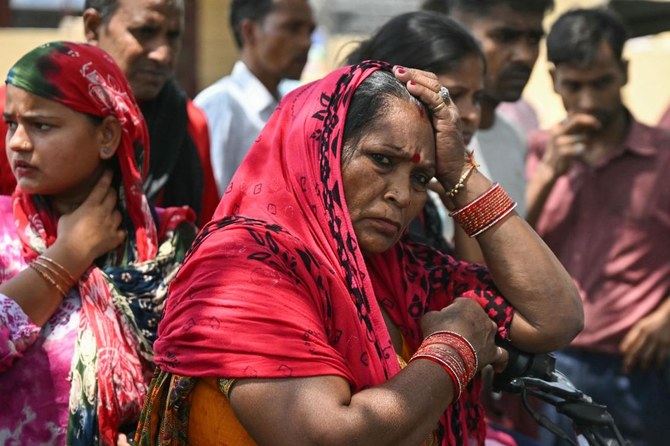
- Blaze broke out at the New Born Baby Care hospital in New Delhi’s Vivek Vihar area late Saturday evening
- The narrow two-story hospital building was squeezed between a row of homes, without space on either side
NEW DELHI: Indian police said Monday they had arrested a doctor and the owner of an unlicensed hospital where six newborn babies died in a fire in a crowded ward without fire exits.
The blaze broke out at the New Born Baby Care hospital in New Delhi’s Vivek Vihar area late Saturday evening.
In the crucial first minutes, it was bystanders who spotted the fire and braved the blaze to rescue the newborns inside.
“We didn’t even name her... I never even held her in my arms,” Anjar Khan, whose 11-day-old daughter died in the blaze, was quoted as saying by the Hindustan Times.
Vinod Sharma, who lost his day-old baby boy, blamed the hospital authorities for the tragedy.
“He had a problem with breathing. The doctor had said that he will be fine in a few days,” Sharma was quoted as saying by the Indian Express newspaper.
“We didn’t know that the hospital would kill him.”
Fires are common in India due to poor building practices, overcrowding and a lack of adherence to safety regulations.
The narrow two-story hospital building was squeezed between a row of homes, without space on either side, making it hard for fire engines to reach.
“We were trying to control the fire, but there was no way to enter the building and rescue the 12 babies who were trapped,” local fire officer Atul Garg told reporters.
Senior police officer Surendra Chaudhary told AFP that the hospital did “not have a fire exit system.”
Its license had expired in March and the owner had crammed into the ward more than twice the number of beds it previously had permission for.
“The hospital had permission for up to five beds but they had installed more than 10 beds,” he said.
“In view of all this, we have made the arrests.”
Five babies pulled out from the fire are still recovering in another hospital.
The blaze in the hospital on Saturday broke out just hours after a separate fire at an amusement park in India’s western state of Gujarat.
The toll from that fire rose to 28 on Monday, police said.
The blaze — which ripped through a center with a bowling alley and other games crowded with youngsters — was triggered by welding work on the ground floor, chief fire officer Ilesh Kher told reporters.
“The CCTV footage clearly shows that a spark from the welding work fell on a stack of corrugated cardboard sheets below, causing the fire,” Kher said.
“This spread very fast as the material was highly flammable.”
The corpses were so badly burned they have not been identified so far.
Police have charged seven people with culpable homicide in connection to that fire.
The two fires came as northern India was gripped by intense heat, with temperatures in Delhi hitting 46.8° Celsius on Saturday, according to the India Meteorological Department.
China to host Egypt’s El-Sisi, Arab leaders this week
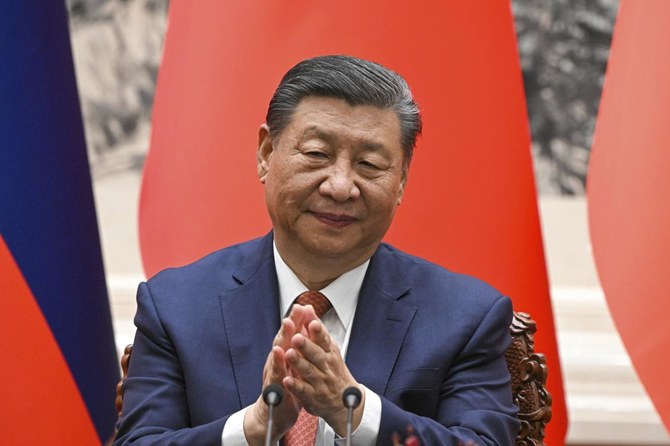
- Speaking at a press conference in Beijing, Vice Foreign Minister Deng Li said President Xi Jinping would attend the forum and deliver a keynote address on Thursday
BEIJING: China will host Egyptian President Abdel Fattah El-Sisi as well as a number of other Arab leaders in Beijing this week, its foreign ministry said Monday.
The leaders will from Tuesday to Saturday “pay state visits to China and attend the opening ceremony of the 10th Ministerial Conference of the China-Arab States Cooperation Forum,” foreign ministry spokeswoman Hua Chunying said in a statement.
Also among the delegation will be Bahrain’s King Hamad, Tunisian President Kais Saied and the United Arab Emirates President Sheikh Mohamed bin Zayed Al Nahyan.
Speaking at a press conference in Beijing, Vice Foreign Minister Deng Li said President Xi Jinping would attend the forum and deliver a keynote address on Thursday.
Xi would also “hold talks with the four heads of state respectively to exchange views on bilateral relations and regional and international issues of common concern,” Deng said.
The forum would aim to deepen “consensus between China and Arab countries,” Deng said, and would be co-chaired by top diplomat Wang Yi and his Mauritanian counterpart.
They would also “issue a common voice between China and Arab countries on the Palestinian issue,” he said.
China has sought to build closer ties with Arab states in recent years, and last year brokered a detente between Tehran and its long-time foe Saudi Arabia.
During a tour of the Middle East in January, top diplomat Wang met El-Sisi in Cairo, saying relations had reached their “best level” in history, according to a foreign ministry readout.
And the meeting with Arab leaders in Beijing comes as China seeks to position itself as a mediator in the conflict between the Palestinian militant group Hamas and Israel.
Wang’s trip to Egypt saw the two countries release a joint statement on the conflict, expressing support for a “comprehensive, just and lasting settlement.”
China has historically been sympathetic to the Palestinian cause and supportive of a two-state solution to the Israeli-Palestinian conflict.
And Xi has called for an “international peace conference” to resolve the fighting.
Israel’s has has killed at least 35,984 people in Gaza since Oct. 7, mostly civilians, according to the Hamas-run territory’s health ministry.
Cyclone Remal kills four, snaps power links to millions in India, Bangladesh
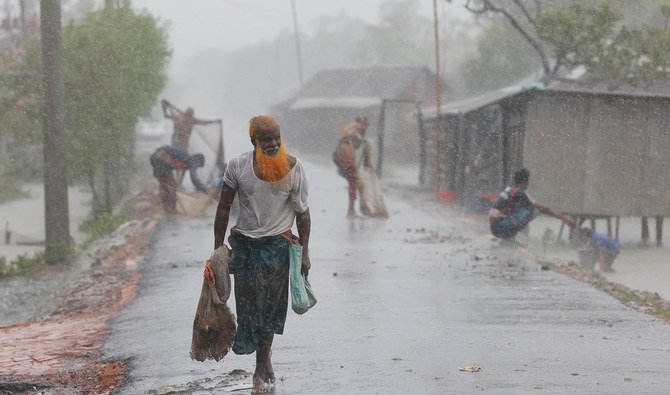
- Fierce winds snap power lines, uproot poles and trees as cyclone Remal lashes coastlines of India, Bangladesh
- Bangladesh has moved nearly 800,000 people to storm shelters while India has safely relocated around 110,000
SATKHIRA, Bangladesh: Strong gales and heavy rain brought by cyclone Remal lashed the coastlines of India and Bangladesh on Monday, killing at least four people and cutting electricity supply to millions before losing intensity.
The year's first cyclone in the region is the latest of the frequent storms that have pounded the low-lying coasts of the South Asian neighbors in recent years, as climate change drives up surface temperatures at sea.
Fierce winds snapped power lines, uprooted poles and trees and snatched the roofs off some tin and thatched houses while the rain and high tides damaged some embankments and flooded coastal areas.
"We have had no electricity since night, my mobile battery will run out anytime," said Rahat Raja, a resident of Bangladesh's coastal district of Satkhira. "By Allah's grace, the cyclone was not as violent as we thought."
Nearly 3 million people in Bangladesh were without electricity, officials of its power ministry said.
Both nations moved nearly a million people to storm shelters, about 800,000 of them in Bangladesh, and roughly 110,000 in India, authorities said.
Two people were killed in Bangladesh as they headed to cyclone shelters at the 11th hour, said disaster management chief Mijanur Rahman.
"People are usually very reluctant to leave their livestock and homes to go to cyclone shelters," he said. "They wait until the last minute when it is often too late."
Authorities will need more time to gauge the full extent of losses, he added.
The storm, packing speeds of up to 135 kph (84 mph), crossed the area around Bangladesh's southern port of Mongla and the adjoining Sagar Islands in India's eastern state of West Bengal late on Sunday, Indian weather officials said.
It began making landfall in India at about 9 p.m., a process that ran for about five hours, weather officials added, before weakening into a cyclone during Monday morning.
Now it is expected to move northeast and weaken further, bringing more rain to states there, they added, as winds and rains eased.
One person was crushed to death by falling concrete in the state capital of Kolkata, authorities said, while a woman died when a mud home collapsed on the island of Mousuni in the Sundarbans delta.
High tides breached some protective river embankments in the area, home to some of the world's largest mangrove forests, which is shared by India and Bangladesh.
Rain flooded roads and disrupted travel in Dhaka, the capital of Bangladesh, where authorities gearing for the storm set up nearly 8,000 cyclone shelters and drafted in 78,000 volunteers.
India's navy put ships, aircraft, divers and medical supplies on standby for rescue operations.
POWER SUPPLY HIT
Though early warnings and timely evacuation helped avert major casualties, the storm took a heavy toll of utilities in both countries.
Bangladesh shut down electricity supply to many areas in advance to avoid accidents, while many coastal towns were left in the dark as fallen trees and snapped electricity lines disrupted supply, power ministry officials said.
Reports of at least 356 uprooted electricity poles and damage to scores of transformers flowed in early during the storm's landfall in India, said Arup Biswas, the power minister in its state of West Bengal.
Kolkata resumed flights on Monday after more than 50 were cancelled on Sunday, when the storm forced suspension of operations, while suburban train services were also restored.
Rains brought by the storm flooded many streets, television images showed, with reports of wall collapses and at least 52 fallen trees, some of them blocking roads.
Bangladesh suspended operations in its ports of Mongla and nearby Chittagong.



